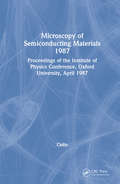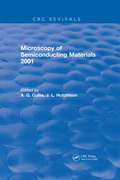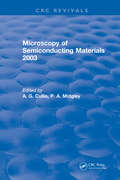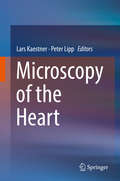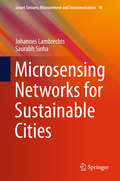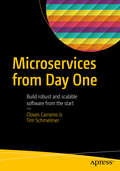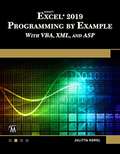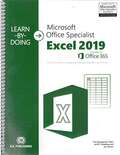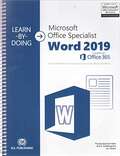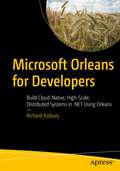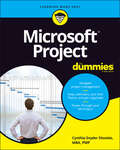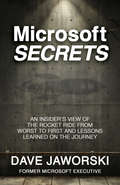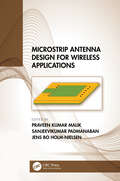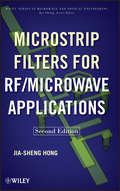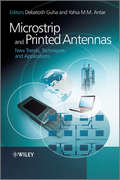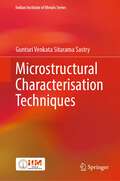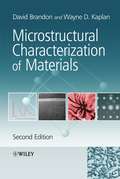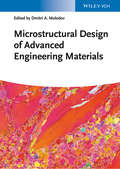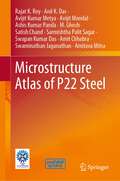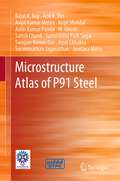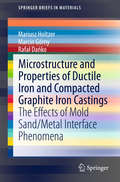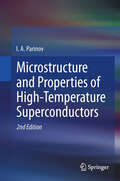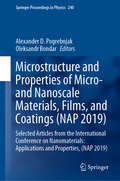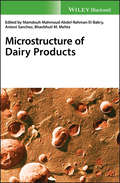- Table View
- List View
Microscopy of Semiconducting Materials 1987, Proceedings of the Institute of Physics Conference, Oxford University, April 1987
by A.G. CullisThe various forms of microscopy and related microanalytical techniques are making unique contributions to semiconductor research and development that underpin many important areas of microelectronics technology. Microscopy of Semiconducting Materials 1987 highlights the progress that is being made in semiconductor microscopy, primarily in electron probe methods as well as in light optical and ion scattering techniques. The book covers the state of the art, with sections on high resolution microscopy, epitaxial layers, quantum wells and superlattices, bulk gallium arsenide and other compounds, properties of dislocations, device silicon and dielectric structures, silicides and contacts, device testing, x-ray techniques, microanalysis, and advanced scanning microscopy techniques. Contributed by numerous international experts, this volume will be an indispensable guide to recent developments in semiconductor microscopy for all those who work in the field of semiconducting materials and research development.
Microscopy of Semiconducting Materials 2001: Proceedings Of The Royal Microscopical Society Conference, Oxford University, 25-29 March 2001
by A.G. CullisThe Institute of Physics Conference Series is a leading International medium for the rapid publication of proceedings of major conferences and symposia reviewing new developments in physics and related areas. Volumes in the series comprise original refereed papers and are regarded as standard referee works. As such, they are an essential part of major libration collections worldwide.The twelfth conference on the Microscopy of Semiconducting Materials (MSM) was held at the University of Oxford, 25-29 March 2001. MSM conferences focus on recent international advances in semiconductor studies carried out by all forms of microscopy. The event was organized with scientific sponsorship by the Royal Microscopical Society, The Electron Microscopy and Analysis Group of the Institute of Physics and the Materials Research Society. With the continual shrinking of electronic device dimensions and accompanying enhancement in device performance, the understanding of semiconductor microscopic properties at the nanoscale (and even at the atomic scale) is increasingly critical for further progress to be achieved. This conference proceedings provides an overview of the latest instrumentation, analysis techniques and state-of-the-art advances in semiconducting materials science for solid state physicists, chemists, and materials scientists.
Microscopy of Semiconducting Materials 2003
by CullisModern electronic devices rely on ever-greater miniaturization of components, and semiconductor processing is approaching the domain of nanotechnology. Studies of devices in this regime can only be carried out with the most advanced forms of microscopy. Accordingly, Microscopy of Semiconducting Materials focuses on international developments in semiconductor studies carried out by all forms of microscopy. It provides an overview of the latest instrumentation, analysis techniques, and state-of-the-art advances in semiconducting materials science for solid state physicists, chemists, and material scientists.
Microscopy of Semiconducting Materials: 1999 Proceedings of the Institute of Physics Conference held 22-25 March 1999, University of Oxford, UK (Institute of Physics Conference Series)
by A G Cullis R BeanlandWith IC technology continuing to advance, the analysis of very small structures remains critically important. Microscopy of Semiconducting Materials provides an overview of advances in semiconductor studies using microscopy. The book explores the use of transmission and scanning electron microscopy, ultrafine electron probes, and EELS to investigat
Microscopy of the Heart
by Lars Kaestner Peter LippThis book provides in depths information on different microscopy approaches and supplies the reader with methods how to untangle highly complex processes involved in physiological and pathophysiological cardiac signaling. Microscopy approaches have established themselves as the quasi gold standard that enables us to appreciate the underlying mechanisms of physiological and pathophysiological cardiac signaling. This book presents the most important microscopy techniques from the level of individual molecule e.g. Förster-Resonance Energy Transfer (FRET), up to cellular and tissue imaging, e.g. electron microscopy (TEM) or light sheet microscopy. The book is intended for graduate students and postdocs in cardiovascular research, imaging and cell biology, pre-clinical and clinical researchers in cardiovascular sciences as well as decision makers of the pharmaceutical industry.
Microsensing Networks for Sustainable Cities
by Saurabh Sinha Johannes LambrechtsThis book explores the microsensing technologies and systems now available to monitor the quality of air and water within the urban environment and examines their role in the creation of sustainable cities against the background of the challenges posed by rapid urbanization. The opening section addresses the theoretical and conceptual background of microsensing networks. The coverage includes detailed description of microsensors, supported by design-specific equations, and clear explanation of the ways in which devices that harvest energy from ambient sources can detect and quantify pollution. The practical application of such systems in addressing environmental impacts within cities and in sustainable urban planning is then discussed with the aid of case studies in developing countries. The book will be of interest to all who wish to understand the benefits of microsensing networks in promoting sustainable cities through better delivery of information on health hazards and improved provision of data to environmental agencies and regulatory bodies in order to assist in monitoring, decision-making, and regulatory enforcement.
Microservices From Day One
by Cloves Carneiro Jr. Tim SchmelmerLearn what a microservices architecture is, its advantages, and why you should consider using one when starting a new application. The book describes how taking a microservices approach from the start helps avoid the complexity and expense of moving to a service-oriented approach after applications reach a critical code base size or traffic load. Microservices from Day One discusses many of the decisions you face when adopting a service-oriented approach and defines a set of rules to follow for easily adopting microservices. The book provides simple guidelines and tips for dividing a problem domain into services. It also describes best practices for documenting and generating APIs and client libraries, testing applications with service dependencies, optimizing services for client performance, and much more. Throughout the book, you will follow the development of a sample project to see how to apply the best practices described. What You Will Learn: Apply guidelines and best practices for developing projects that use microservices Define a practical microservices architecture at the beginning of a project that allows for fast development Define and build APIs based on real-world best practices Build services that easily scale by using tools available in most programming languages Test applications in a distributed environment Who This Book is For: Software engineers and web developers who have heard about microservices, and want to either move the project/applications they work on to a service-oriented environment, or want to start a new project knowing that building services helps with ease of scaling and maintainability. The book is a reference for developers who have a desire to build software in smaller, more focused and manageable chunks, but do not know how to get started.
Microsoft Excel 2019 Programming by Example: With VBA, XML, and ASP
by Julitta KorolUpdated for Excel 2019 and based on the bestselling editions from previous versions, Microsoft Excel 2019 Programming by Example with VBA, XML and ASP is a practical, how-to book on Excel programming, suitable for readers already proficient with the Excel user interface (UI). The book includes companion files with all of the source code and figures used in the text (available with Amazon proof of purchase by writing to the publisher at info@merclearning.com.) <p><p> If you are looking to automate Excel routine tasks, this book will progressively introduce you to programming concepts via numerous illustrated hands-on exercises. More advanced topics are demonstrated via custom projects. From recording and editing a macro and writing VBA code to working with XML documents and using Classic ASP pages to access and display data on the Web, this book takes you on a programming journey that will change the way you work with Excel. The book provides information on performing automatic operations on files, folders, and other Microsoft Office applications. It also covers proper use of event procedures, testing and debugging, and guides you through programming advanced Excel features such as PivotTables, PivotCharts, and the Ribbon interface.
Microsoft Office Specialist Excel 2019
by The Development Team at B.E. Publishing and Joy TavanoDesigned for today's interactive, visual learner, this text consists of graphical hands-on lessons that get students instantly engaged in applying Microsoft Excel 2019 skills. Students will learn how to format data, work with numbers and formulas, and create charts and graphs as they acquire the skills needed for school and workplace readiness.
Microsoft Office Specialist Word 2019
by The Development Team at B.E. Publishing and Joy TavanoDesigned for today's interactive, visual learner, this text consists of graphical hands-on lessons that get students instantly engaged in applying Microsoft Word 2019 skills. Students will learn how to format text and paragraphs, work with tables, and design sophisticated multi-page documents as they explore the powerful features and interface of Word 2019.
Microsoft Orleans for Developers: Build Cloud-Native, High-Scale, Distributed Systems in .NET Using Orleans
by Richard AstburyUse a simple programming model and the .NET language of your choice to build large distributed systems. This book teaches you the Microsoft Orleans framework.Even well-versed professional software developers with expertise in C# (or another language) find themselves unequipped to meet the challenges of distributed systems as infrastructure moves to multi-core; multiple computers are being used for scale, redundancy, and cloud computing; and multi-region deployment is taking place.Orleans handles many of the concerns of distributed computing and cloud infrastructure, allowing you to concentrate on writing application logic. What You Will Learn Know the key concepts for building distributed systemsGain a background in the origin and evolution of Orleans, and why it is important for your projectsDive into each of the features available in Orleans by building an example applicationDevelop troubleshooting skills for fixing bugs and running diagnosticsAchieve performance optimization and advanced configurationUse the Orleans Dashboard to discern valuable insight in system performance Who This Book Is ForExperienced C# developers who want to build a new high-scale application (perhaps for an IoT requirement) and are interested in learning the concepts and features available in Orleans
Microsoft Project For Dummies
by Cynthia Snyder DionisioBlow past the jargon and get hands-on, practical guidance on managing any project with Microsoft Project Lean. Agile. Hybrid. It seems that project management these days comes with more confusing buzzwords than ever. But you can make managing your next project simple and straightforward with help from Microsoft Project For Dummies. This book unpacks Microsoft’s bestselling project management platform and walks you through every important feature, step-by-step, until you’re ready to take on virtually any project, no matter the size. From getting set up for the first time to creating tasks, managing resources and working with time management features, you’ll learn everything you need to know about managing a project in Microsoft’s iconic software. You’ll also find: Totally updated guidance that applies to both the desktop version and Microsoft’s new subscription-based Microsoft Project Online Helpful information on integrating Agile practices and techniques into your project “Golden rules” that keep a project on-track and on-time Ways to effectively manage your resources with Microsoft Project’s built-in functionality Managing a project, big or small, is no easy task. Luckily, Microsoft Project For Dummies can take a lot of the hassle out of your day-to-day life. Learn how to take advantage of this powerful software today!
Microsoft Secrets: An Insider’s View of the Rocket Ride from Worst to First and Lessons Learned on the Journey
by Dave JaworskiA great deal has been written about Steve Jobs and Apple. Not nearly as much has been produced about Bill Gates and Microsoft, especially in the ten-year period that Dave Jaworski was at Microsoft. Microsoft was the company that drove the hardest and built the fastest. He was there during this rapid rise to the top. Dave kept meticulous notes and took lots of photos and documented the risks taken, the dreams shared, the lessons learned, the hopes realized, and the mistakes made. Many of the issues at the time are similar to issues confronting leaders in business today. All can learn from Microsoft’s past. Dave also details several secrets—some only his family knows. Some of these secrets were known to only a handful of people within the company at a time when it went through its explosive growth period: like the secret recipe for Coca-Cola or Colonel Sanders’ chicken recipe, these secrets were literally changing the competitive landscape in the technology industry and were rewriting the business rules of the day. Understanding these secrets and the thinking behind them can provide strategic insights and advantages to professionals and their businesses. Better still, they can help them define their own secrets to accelerate them past competitors and over hurdles to success.
Microstrip Antenna Design for Wireless Applications
by Praveen Kumar MalikThis book focuses on recent advances in the field of microstrip antenna design and its applications in various fields including space communication, mobile communication, wireless communication, medical implants and wearable applications. Scholars as well as researchers and those in the electronics/ electrical/ instrumentation engineering fields will benefit from this book. The book shall provides the necessary literature and techniques using which to assist students and researchers would design antennas for the above- mentioned applications and will ultimately enable users to take measurements in different environments. It is intended to help scholars and researchers in their studies, by enhancing their the knowledge and skills in on the latest applications of microstrip antennas in the world of communications such as world like IoT, D2D, satellites and wearable devices, to name a few. FEATURES Addresses the complete functional framework workflow in printed antenna design systems Explores the basic and high-level concepts, including advanced aspects in planer design issues, thus serving as a manual for those in the the industry while also assisting beginners Provides the latest techniques used for antennas in terms of structure, defected ground, MIMO and fractal designs Discusses case studies related to data-intensive technologies in microchip antennas in terms of the most recent applications and similar uses for the Internet of Things and device-to-device communication
Microstrip Filters for RF/Microwave Applications
by Jia-Sheng HongThe first edition of "Microstrip Filters for RF/Microwave Applications" was published in 2001. Over the years the book has been well received and is used extensively in both academia and industry by microwave researchers and engineers. From its inception as a manuscript the book is almost 8 years old. While the fundamentals of filter circuits have not changed, further innovations in filter realizations and other applications have occurred with changes in the technology and use of new fabrication processes, such as the recent advances in RF MEMS and ferroelectric films for tunable filters; the use of liquid crystal polymer (LCP) substrates for multilayer circuits, as well as the new filters for dual-band, multi-band and ultra wideband (UWB) applications. Although the microstrip filter remains as the main transmission line medium for these new developments, there has been a new trend of using combined planar transmission line structures such as co-planar waveguide (CPW) and slotted ground structures for novel physical implementations beyond the single layer in order to achieve filter miniaturization and better performance. Also, over the years, practitioners have suggested topics that should be added for completeness, or deleted in some cases, as they were not very useful in practice. In view of the above, the authors are proposing a revised version of the "Microstrip Filters for RF/Microwave Applications" text and a slightly changed book title of "Planar Filters for RF/Microwave Applications" to reflect the aforementioned trends in the revised book.
Microstrip and Printed Antennas
by Yahia M.M. Antar Debatosh GuhaThis book focuses on new techniques, analysis, applications and future trends of microstrip and printed antenna technologies, with particular emphasis to recent advances from the last decadeAttention is given to fundamental concepts and techniques, their practical applications and the future scope of developments. Several topics, essayed as individual chapters include reconfigurable antenna, ultra-wideband (UWB) antenna, reflectarrays, antennas for RFID systems and also those for body area networks. Also included are antennas using metamaterials and defected ground structures (DGSs). Essential aspects including advanced design, analysis and optimization techniques based on the recent developments have also been addressed.Key Features:Addresses emerging hot topics of research and applications in microstrip and printed antennas Considers the fundamental concepts, techniques, applications and future scope of such technologies Discusses modern applications such as wireless base station to mobile handset, satellite earth station to airborne communication systems, radio frequency identification (RFID) to body area networks, etc. Contributions from highly regarded experts and pioneers from the US, Europe and Asia This book provides a reference for R&D researchers, professors, practicing engineers, and scientists working in these fields. Graduate students studying/working on related subjects will find this book as a comprehensive literature for understanding the present and future trends in microstrip and printed antennas.
Microstructural Characterisation Techniques (Indian Institute of Metals Series)
by Gunturi Venkata SastryThis textbook is aimed at graduate and upper undergraduate students studying materials science and metallurgy. It comprehensively covers the topic of microstructural characterization and includes an emphasis on Fourier analysis and Fourier transformation, electron diffraction, electromagnetic waves and electron waves, lens parameters, transmission electron microscopy, optical microscopy and scanning electron microscopy. The author has included pedagogical features such as end-of-chapter exercises and worked examples with varying degrees of difficulty to augment learning and self-testing. This book will be a useful guide for upper undergraduate and graduate students along with researchers and professionals working in the field of microstructural characterization.
Microstructural Characterization of Materials
by David Brandon Wayne D. KaplanMicrostructural characterization is usually achieved by allowing some form of probe to interact with a carefully prepared specimen. The most commonly used probes are visible light, X-ray radiation, a high-energy electron beam, or a sharp, flexible needle. These four types of probe form the basis for optical microscopy, X-ray diffraction, electron microscopy, and scanning probe microscopy.Microstructural Characterization of Materials, 2nd Edition is an introduction to the expertise involved in assessing the microstructure of engineering materials and to the experimental methods used for this purpose. Similar to the first edition, this 2nd edition explores the methodology of materials characterization under the three headings of crystal structure, microstructural morphology, and microanalysis. The principal methods of characterization, including diffraction analysis, optical microscopy, electron microscopy, and chemical microanalytical techniques are treated both qualitatively and quantitatively. An additional chapter has been added to the new edition to cover surface probe microscopy, and there are new sections on digital image recording and analysis, orientation imaging microscopy, focused ion-beam instruments, atom-probe microscopy, and 3-D image reconstruction. As well as being fully updated, this second edition also includes revised and expanded examples and exercises, with a solutions manual available at http://develop.wiley.co.uk/microstructural2e/ Microstructural Characterization of Materials, 2nd Edition will appeal to senior undergraduate and graduate students of material science, materials engineering, and materials chemistry, as well as to qualified engineers and more advanced researchers, who?will find the book a useful and comprehensive general reference source.
Microstructural Design of Advanced Engineering Materials
by Dmitri A. MolodovThe choice of a material for a certain application is made taking into account its properties. If, for example one would like to produce a table, a hard material is needed to guarantee the stability of the product, but the material should not be too hard so that manufacturing is still as easy as possible - in this simple example wood might be the material of choice. When coming to more advanced applications the required properties are becoming more complex and the manufacturer`s desire is to tailor the properties of the material to fit the needs. To let this dream come true, insights into the microstructure of materials is crucial to finally control the properties of the materials because the microstructure determines its properties.Written by leading scientists in the field of microstructural design of engineering materials, this book focuses on the evolution and behavior of granular microstructures of various advanced materials during plastic deformation and treatment at elevated temperatures. These topics provide essential background and practical information for materials scientists, metallurgists and solid state physicists.
Microstructure Atlas of P22 Steel
by Amitava Mitra Sarmishtha Palit Sagar M. Ghosh Rajat K. Roy Anil K. Das Avijit Kumar Metya Avijit Mondal Ashis Kumar Panda Satish Chand Swapan Kumar Das Amit Chhabra Swaminathan JaganathanThis book highlights the qualitative and quantitative sequential changes in microstructure of P22 steel under various stress and temperature conditions. The P22 alloy is an established material used under elevated temperature and stress for the components of thermal power plants. Temperature and stress levels for laboratory experimentation have been selected based on the true operating condition of a boiler. This book describes both continuous as well as interrupted tests that were performed under given parameters. Subsequently, the microstructures, bulk hardness and NDE parameters (magnetic and non-linear ultrasonic) have been evaluated. For reliable data, the microstructures have been observed at different regions of creep exposed samples by different characterization techniques. This has been further followed by drawing correlation between specific features like precipitate size variation with creep strain / creep time and so on. Given the contents, this book will be a useful reference for researchers and professionals working in the area of materials especially in thermal power plants.
Microstructure Atlas of P91 Steel
by Amitava Mitra Sarmishtha Palit Sagar M. Ghosh Rajat K. Roy Anil K. Das Avijit Kumar Metya Avijit Mondal Ashis Kumar Panda Satish Chand Swapan Kumar Das Amit Chhabra Swaminathan JaganathanThis book highlights the qualitative and quantitative sequential changes in microstructure of P91 steel under various stress and temperature conditions. The P91 alloy is an established material used under elevated temperature and stress in the components of thermal power plants. Temperature and stress levels for laboratory experimentation have been selected based on the true operating condition of a boiler. This book describes both full length as well as interrupted tests that were performed under given parameters. Subsequently, the microstructures, bulk hardness and NDE parameters (magnetic and non-linear ultrasonic) have been evaluated. For reliable data, the microstructures have been observed at different regions of creep exposed samples by different characterization techniques. This has been further followed by drawing co-relation between specific features like precipitate size variation with creep strain / creep time and so on. Given the contents, this book will be a useful reference for researchers and professionals working in the area of materials especially in thermal power plants.
Microstructure and Properties of Ductile Iron and Compacted Graphite Iron Castings
by Mariusz Holtzer Marcin Górny Rafał DańkoThis book provides an overview of the surface effects at the interface boundary of metal/sand moulds, and their influence on the surface quality, microstructure and mechanical and anticorrosive properties of high-quality cast iron. It explores utilitarian aspects of the production of high-quality cast iron castings, including thin-walled castings of high-quality cast iron alloys, and examines problems related to the determination of moulding sands and reclaim quality, and their influence on castings. Presenting new material, this book takes into account the influence of metal quality, pouring temperature, solidification time, the quality of moulding sand with the reclaim application, as well the binders of moulding sands, on the formation of the degenerated graphite near surface layers. It also employs the latest research methods, such as a wavelength-dispersive spectrometer (WDS) analysis and thermodynamic calculations, which were carried out on the reactions occurring in the study area. Providing a valuable resource to academics and researchers interested in materials science, metal casting and metallurgy, this book is also intended for metal industry professionals.
Microstructure and Properties of High-Temperature Superconductors
by I. A. ParinovThe main features of high-temperature superconductors (HTSC) that define their properties are intrinsic brittleness of oxide cuprates, the layered anisotropic structure and the supershort coherence length. Taking into account these features, this treatise presents research into HTSC microstructure and properties, and also explores the possibilities of optimization of the preparation techniques and superconducting compositions. The "composition-technique-experiment-theory-model," employed here, assumes considerable HTSC defectiveness and structure heterogeneity and helps to draw a comprehensive picture of modern representations of the microstructure, strength and the related structure-sensitive properties of the materials considered. Special attention is devoted to the Bi-Sr-Ca-Cu-O and Y-Ba-Cu-O families, which currently offer the most promising applications. Including a great number of illustrations and references, this monograph addresses students, post-graduate students and specialists, taking part in the development, preparation and research of new materials. The new edition had been updated intensively, especially experimental investigations and modeling conductive and elastic properties of HTC superconductors have been added.
Microstructure and Properties of Micro- and Nanoscale Materials, Films, and Coatings: Selected Articles from the International Conference on Nanomaterials: Applications and Properties, (NAP 2019) (Springer Proceedings in Physics #240)
by Alexander D. Pogrebnjak Oleksandr BondarThis book presents the findings of experimental and theoretical (including first-principles molecular dynamics simulation) studies of nanostructured and nanocomposite metal-based materials, and nanoscale multilayer coatings fabricated by physical or chemical vapor deposition, magnetron sputtering, electrospark alloying, ionic layer absorption, contact melting, and high-current electron beam irradiation. It also discusses novel methods of nanocomposite formation, as well as the structure of the deposited films, coatings and other nanoscale materials, their elemental and phase composition, and their physical–mechanical, tribological, magnetic and electrical properties. Lastly, it explores the influence of a various surface modification methods, such as thermal annealing, pulsed laser modification, and thermomechanical and ultrasonic treatment, as well as different properties of nanostructured films.
Microstructure of Dairy Products
by Bhavbhuti M. Mehta Mamdouh El-Bakry Antoni SanchezProvides the most recent developments in microscopy techniques and types of analysis used to study the microstructure of dairy products This comprehensive and timely text focuses on the microstructure analyses of dairy products as well as on detailed microstructural aspects of them. Featuring contributions from a global team of experts, it offers great insight into the understanding of different phenomena that relate to the functional and biochemical changes during processing and subsequent storage. Structured into two parts, Microstructure of Dairy Products begins with an overview of microscopy techniques and software used for microstructural analyses. It discusses, in detail, different types of the following techniques, such as: light microscopy (including bright field, polarized, and confocal scanning laser microscopy) and electron microscopy (mainly scanning and transmission electron microscopy). The description of these techniques also includes the staining procedures and sample preparation methods developed. Emerging microscopy techniques are also covered, reflecting the latest advances in this field. Part 2 of the book focuses on the microstructure of various dairy foods, dividing each into sections related to the microstructure of milk, cheeses, yogurts, powders, and fat products, ice cream and frozen dairy desserts, dairy powders and selected traditional Indian dairy products. In addition, there is a review of the localization of microorganism within the microstructure of various dairy products. The last chapter discusses the challenges and future trends of the microstructure of dairy products. Presents complete coverage of the latest developments in dairy product microscopy techniques Details the use of microscopy techniques in structural analysis An essential purchase for companies, researchers, and other professionals in the dairy sector Microstructure of Dairy Products is an excellent resource for food scientists, technologists, and chemists—and physicists, rheologists, and microscopists—who deal in dairy products.
